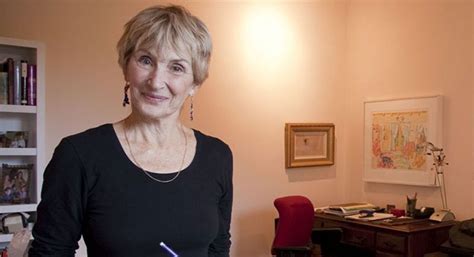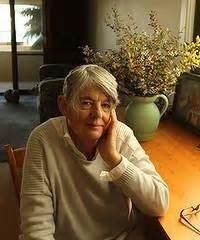A Quote by Ian Mcewan
At that moment, the urge to be writing was stronger than any notion she had of what she might write.
Related Quotes
Francie was ten years old when she first found an outlet in writing. What she wrote was of little consequence. What was important was that the attempt to write stories kept her straight on the dividing line between truth and fiction. If she had not found this outlet in writing, she might have grown up to be a tremendous liar.
Art glows with faith even in its weakest parts. At every moment, writing is an act of self-confidence – the sheerest, most determined, most stubborn self-belief. You CAN have faith and doubt at the same time; the most insecure writer on the planet has faith that shines just as bright as her doubt, and she deserves props for that. It might be hidden deep, she might not feel it and you might not see it, but it’s in there, or she wouldn’t be able to write.
She smiled. She knew she was dying. But it did not matter any longer. She had known something which no human words could ever tell and she knew it now. She had been awaiting it and she felt it, as if it had been, as if she had lived it. Life had been, if only because she had known it could be, and she felt it now as a hymn without sound, deep under the little whole that dripped red drops into the snow, deeper than that from which the red drops came. A moment or an eternity- did it matter? Life, undefeated, existed and could exist. She smiled, her last smile, to so much that had been possible.
In this moment she felt that she had been robbed of an enormous number of valuable things, whether material or intangible: things lost or broken by her own fault, things she had forgotten and left in houses when she moved: books borrowed from her and not returned, journeys she had planned and had not made, words she had waited to hear spoken to her and had not heard, and the words she meant to answer with. . . .
The doctor's wife wasn't a bad woman. She was sufficiently convinced of her own importance to believe that God actually did watch everything she did and listen to everything she said, and she was too taken up with rooting out the pride she was prone to feeling in her own holiness to notice any other failings she might have had. She was a do-gooder, which means that all the ill she did, she did without realizing it.
At that moment a very good thing was happening to her. Four good things had happened to her, in fact, since she came to Misselthwaite Manor. She had felt as if she had understood a robin and that he had understood her; she had run in the wind until her blood had grown warm; she had been healthily hungry for the first time in her life; and she had found out what it was to be sorry for someone.
Though at this moment she felt abused, abandoned, and ashamed of herself, Madeleine knew that she was still young, that she had her whole life ahead of her--a life in which, if she persevered, she might do something special--and that part of persevering meant getting past moments just like this one, when people made you feel small, unlovable, and took away your confidence.
Yes," she answers and does not move. She might, at this moment, be nothing but a floating intelligence; not even a brain inside a skull, just a presence that perceives, as a ghoast might. Yes, she thinks, this is probably how it must feel to be a ghost. It's a little like reading, isn't it-that same sensation of knowing people, settings, situations, without playing any particular part beyond that of the willing observer.
Yet losing him seemed unbearable. He was the one she loved, the one she would always love, and as he leaned in to kiss her, she gave herself over to him. While he held her close, she ran her hands over his shoulders and back, feeling the strength in his arms. She knew he’d wanted more in their relationship than she’d been willing to offer, but here and now, she suddenly knew she had no other choice. There was only this moment, and it was theirs.






































